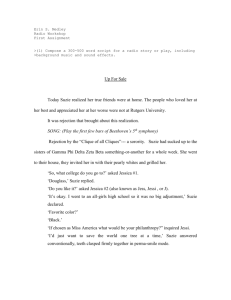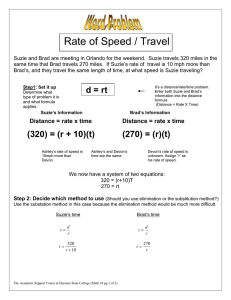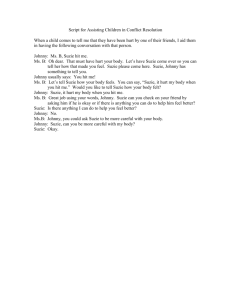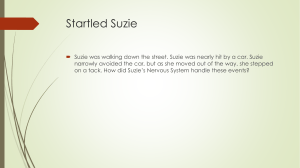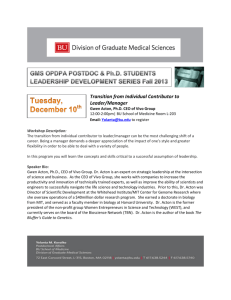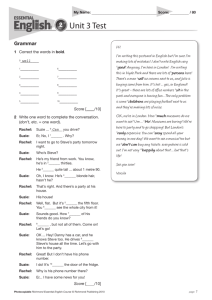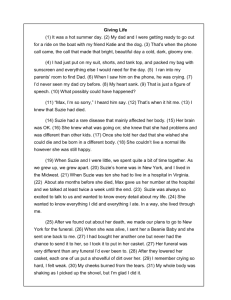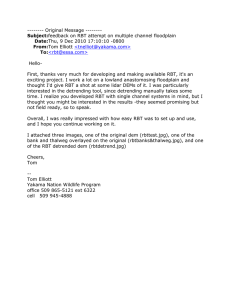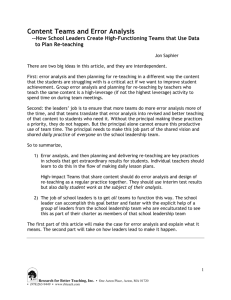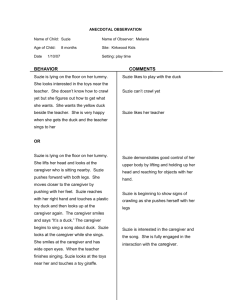Research for Better Teaching
advertisement
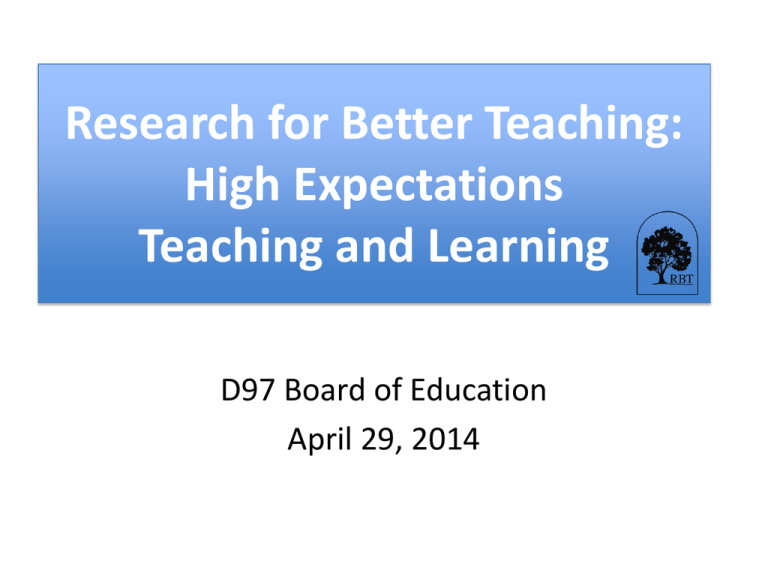
Research for Better Teaching: High Expectations Teaching and Learning D97 Board of Education April 29, 2014 PRESENTERS Lynne Beauprez Renee DeWald Angela Dolezal Karen Foleno Suzie Hackmiller Frances Kraft Jennifer Las Felicia Starks Turner Melissa Woods 2 INTRODUCTION 3 HISTORY OF THE RESEARCH FOR BETTER TEACHING •Founded in 1979 by Dr. Jon Saphier, Research for Better is a school improvement organization with extensive experience in teaching and leadership. We work in-depth with over 100 school districts across the United States each year. •The mission of RBT is to build individual and institutional capacity to sustain increased student achievement. •RBT offers programs for teachers to support their professional growth, strengthen collegiality, and encourage experimentation through direct study of the knowledge base on teaching. THE KNOWLEDGE BASE OF TEACHING Overarching Objectives Curriculum Design Planning Curriculum Planning Objectives Learning Experiences Assessment Personal Relationship Building Class Climate Motivation Expectations Clarity Space Principles of Learning Time Models of Teaching Instruction Strategies Routines Management Attention Momentum Foundation of Essential Beliefs Discipline STANDARDS AND EXPECTATIONS Standards: Established levels of proficiency (quantity and quality of work, work habits and procedures, general routines, interpersonal behavior). Expectations: Our beliefs about students capacity to achieve the standards. ESSENTIAL QUESTION What do teachers do to create an atmosphere in which high expectations are communicated clearly and convincingly to all students, not just some? 7 COMPONENTS OF HIGH EXPECTATIONS TEACHING • • • • Teacher choice of language Regular classroom mechanisms Daily instructional strategies Explicitly teaching students what effective effort is TEACHER CHOICE OF LANGUAGE IN: • • • • • • • Patterns of calling on students Giving Help Responses to student answers Dealing with errors Being tenacious Giving Tasks and Assignments Positive Re-framing of Re-Teaching TEACHER CHOICE OF LANGUAGE 3 Key Expectations Messages This is important. You can do it. I won’t give up on you…even when you give up on yourself. RESPONDING TO STUDENT ANSWERS AND TENACITY IN MELISSA WOOD’S 7TH GRADE MATH CLASS Sticking With Students ----> Wait Time + Prompting = Success! Wait Time: Can Be Uncomfortable Prompting: Only after waiting (purposeful pause) Success: Rewarding “Ms. Woods, you didn’t stick with the student!” 11 REGULAR CLASSROOM MECHANISMS (MOTIVATIONAL STRUCTURES): • • • • • • • • • • • Frequent quizzes, feedback and data to students Student Self-corrections Student Error Analysis Regular re-teaching, retakes, and required re-do’s Grading practices Cooperative Learning and teaching of group skills Extra help Clear, accessible criteria for success and exemplars Learning study strategies Self-evaluation Student goal setting RETAKING TESTS IN JASON LUKEHART’S 4TH GRADE CLASS To insist that the original grade is the only one that matters sends children the message that education is about scores and deadlines. “These are the things you’re supposed to know, and if you don’t know them this date, then the time you put in to trying to know them was wasted, because we’re moving on.” On the other hand, allowing students to retake tests sends the message that what matters is learning. Students should be encouraged to keep at something until they understand it, whether that happens on day one, or day one hundred. Jason Lukehart SUZIE HACKMILLER’S GOAL SETTING IN HOLMES SCHOOL SUZIE HACKMILLER’S GOAL SETTING IN HOLMES SCHOOL DAILY INSTRUCTIONAL STRATEGIES FOR: • • • • • Communicating objectives with criteria for success in student friendly language Giving students feedback according to criteria for success with precise diagnostic guidance Checking for Understanding Making Students’ Thinking Visible Frequent student summarizing Mastery Objectives Students will be able to answer… • What will I be able to do when I've finished this lesson? • How will I show that I can do this, and how well will I have to do it? • What new knowledge or skill is important for me to learn and understand so that I can do this? Teachers need to dig into the content to examine its nuances and central ideas before arriving at the objective. PLANNING CONFERENCES A planning conference • Is a thoughtful look at the nuances of the content to improve lesson effectiveness • Focuses on the concepts and how they relate to each other and what might be difficult for students to learn • Identifies what is really important and results in a better sequencing of activities ANGELA DOLEZAL CONDUCTING PLANNING CONFERENCES AT LONGFELLOW Steps Quotes Dive right into the content “What content will you be focusing on?” Directly examine the actual materials that will be used to teach the content “What materials will you be handing to the students?” Focus on key concepts that the teacher wants the students to take away from the lesson “What are the most important things you want them to understand?” Delve deeply into the meaning of the content with particular focus on the key concepts “Can you explain that a little further?” “What exactly do you mean when you say…?” Break down the concepts hierarchically “What do students need to know from prior experience in order to move forward?” “Which part of this concept do you think students need to understand first? Have the teacher state the objective in kidfriendly language “How will you present the objectives to the class?” CHECKING FOR UNDERSTANDING Elicit answers from all students Frequently On the same concept or topic During instruction Outcomes More active student involvement Data on where the learners are Decisions about the teacher’s next steps 20 20 CHECKING FOR UNDERSTANDING IN FRANCES KRAFT’S 5TH GRADE CLASSROOM 21 EXPLICITLY TEACHING EFFECTIVE EFFORT • • • Attribution Theory and Brain Research Effective Effort Behaviors Study strategies ABILITY AND EFFORT BASED BELIEF SYSTEMS Belief #1 Š Ability-based Belief 34.1% + + 34.1% 13.6% 13.6% 2.1% 55 70 2.1% 85 100 115 130 145 IQ Ability-based Believers • • • • Avoid challenge Give up easily See effort as useless Ignore constructive feedback • Feel threatened by success of others Effort-based Believers • • • • Embrace challenge Persist See effort as path to success Learn from constructive feedback • Feel inspired by success of others • Are invested in learning 23 EFFORT-BASED BELIEF CYCLE CONFIDENCE CONFIDENCE Ability Ability ACHIEVEMENT ACHIEVEMENT EFFECTIVE EFFECTIVE EFFORT EFFORT Hard HardWork Work Strategies Strategies Research for Better Teaching, Inc., One Acton Place, Acton, MA 01720 - www.RBTeach.com TEACHING EFFECTIVE EFFORT IN JENNIFER LAS’S 1st GRADE CLASSROOM ● “Learning is Messy” ● “Our Effort Paid Off” bulletin board ● Teaching the parents about effort during conferences and newsletters ● 3Ps: pay attention, participate, practice ● Role play 25 EFFECTIVE EFFORT SELF ASSESSMENT IN JENNIFER LAS’S 1ST GRADE CLASSROOM 26 KAREN FOLENO SHARING HIGH EXPECTATION TEACHING STRATEGIES WITH BEYE STAFF 27 KAREN FOLENO SHARING HIGH EXPECTATION TEACHING STRATEGIES WITH BEYE STAFF 28 LYNNE BEAUPREZ SHARING HIGH EXPECTATION TEACHING STRATEGIES THROUGH MENTORING Best Practices Class: * Presented information to 1st year staff on growth mindset, high level of questioning for ALL, giving think-time, sticking with students for giving help & error correction, cooperative learning Observation Feedback: * Feedback given for observation of teacher expectations of ALL students on: building cultural competence and relationships, high level of questioning, giving think-time, giving help & error correction, patterns of calling on students, communicating clear objectives and criteria for success, checking for understanding School Staff Development: * Co-created a workshop session for all Brooks & Julian staff on mindset, effective effort, and tenacity with ALL students 29 Next Steps • Principal–led professional development at April 23rd building staff meetings • On-going professional development at schools in 2014-2015 to support systematic implementation • Continued training and support for this year’s cohort in 2014-2015 • New cohort formed for 2014-2015 • Parent education nights designed to provide parents with strategies and resources to promote effective effort and high expectations at home 30

